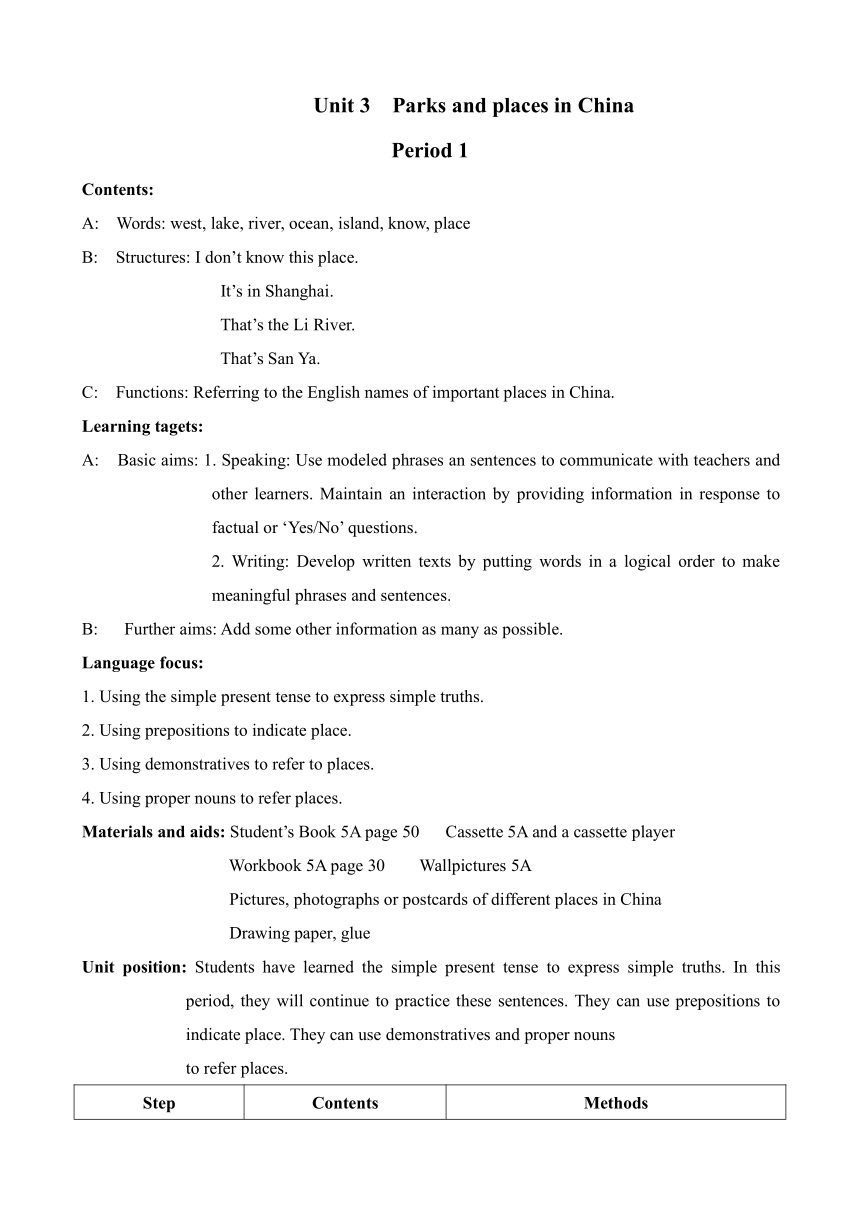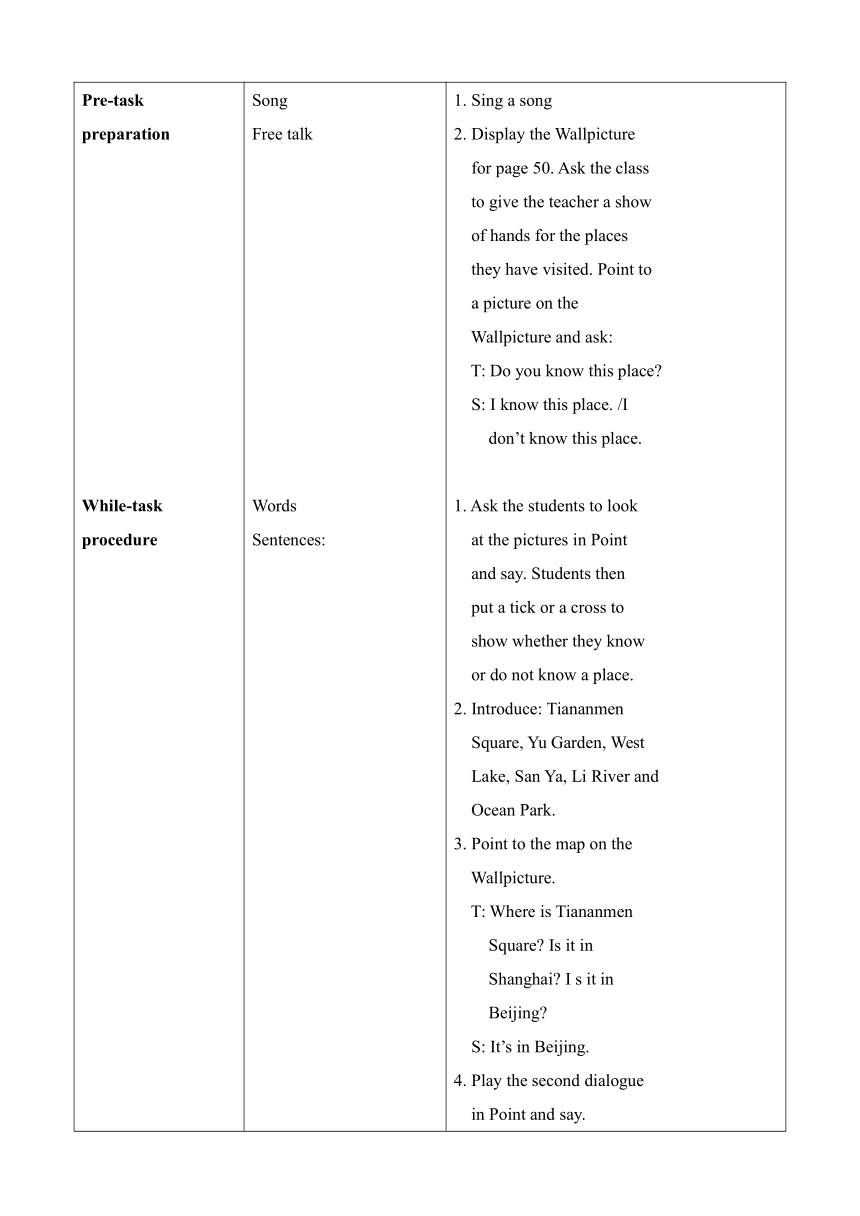沪教牛津版 Unit 3 Parks and places in China period1 教案
文档属性
| 名称 | 沪教牛津版 Unit 3 Parks and places in China period1 教案 |

|
|
| 格式 | zip | ||
| 文件大小 | 13.9KB | ||
| 资源类型 | 教案 | ||
| 版本资源 | 上海牛津(绿色上教版) | ||
| 科目 | 英语 | ||
| 更新时间 | 2012-09-28 00:00:00 | ||
图片预览


文档简介
Unit 3 Parks and places in China
Period 1
Contents:
A: Words: west, lake, river, ocean, island, know, place
B: Structures: I don’t know this place.
It’s in Shanghai.
That’s the Li River.
That’s San Ya.
C: Functions: Referring to the English names of important places in China.
Learning tagets:
A: Basic aims: 1. Speaking: Use modeled phrases an sentences to communicate with teachers and other learners. Maintain an interaction by providing information in response to factual or ‘Yes/No’ questions.
2. Writing: Develop written texts by putting words in a logical order to make meaningful phrases and sentences.
B: Further aims: Add some other information as many as possible.
Language focus:
1. Using the simple present tense to express simple truths.
2. Using prepositions to indicate place.
3. Using demonstratives to refer to places.
4. Using proper nouns to refer places.
Materials and aids: Student’s Book 5A page 50 Cassette 5A and a cassette player
Workbook 5A page 30 Wallpictures 5A
Pictures, photographs or postcards of different places in China
Drawing paper, glue
Unit position: Students have learned the simple present tense to express simple truths. In this period, they will continue to practice these sentences. They can use prepositions to indicate place. They can use demonstratives and proper nouns
to refer places.
Step Contents Methods
Pre-task preparationWhile-task procedurePost-task activity Consolidation SongFree talkWords Sentences: 1. Sing a song2. Display the Wallpicture for page 50. Ask the class to give the teacher a show of hands for the places they have visited. Point to a picture on the Wallpicture and ask: T: Do you know this place S: I know this place. /I don’t know this place.1. Ask the students to look at the pictures in Point and say. Students then put a tick or a cross to show whether they know or do not know a place.2. Introduce: Tiananmen Square, Yu Garden, West Lake, San Ya, Li River and Ocean Park.3. Point to the map on the Wallpicture. T: Where is Tiananmen Square Is it in Shanghai I s it in Beijing S: It’s in Beijing.4. Play the second dialogue in Point and say. Students listen andfollow in their books.5. Ask the students to make postcards by sticking the pictures or photographs onto a small piece of drawing paper. Ask the students to write the name of the place on the back of their postcard. Introduce more places in china to the more able students.6. divide the students into pairs. Ask them to do the role-play of a tourist and a shop assistant. The tourist is choosing some postcards in a shop. Ask the students to talk about the places using the two dialogues in Point and say.7. Remind the students to use the right prepositions.8. Divide the class into groups. Ask the students to put their postcards or photographs on the group’s desk. Tell them to put pictures or postcards of the same place together first.9. Ask the students to stick their pictures on the drawing paper and make a brochure for the tourist. Allow the students to arrange their pictures and postcards in a way they like.10. Encourage them to write a few sentences to describe the places.11. Encourage the students to exchange their work. Put their brochures into the class library.Workbook page 30Students read the captions on the map.Students complete the dialogues orally in pairs.Invite pairs of students to read the dialogues.Students fill in the missing words.Grammar Practice Book 5Apage 43.
Period 1
Contents:
A: Words: west, lake, river, ocean, island, know, place
B: Structures: I don’t know this place.
It’s in Shanghai.
That’s the Li River.
That’s San Ya.
C: Functions: Referring to the English names of important places in China.
Learning tagets:
A: Basic aims: 1. Speaking: Use modeled phrases an sentences to communicate with teachers and other learners. Maintain an interaction by providing information in response to factual or ‘Yes/No’ questions.
2. Writing: Develop written texts by putting words in a logical order to make meaningful phrases and sentences.
B: Further aims: Add some other information as many as possible.
Language focus:
1. Using the simple present tense to express simple truths.
2. Using prepositions to indicate place.
3. Using demonstratives to refer to places.
4. Using proper nouns to refer places.
Materials and aids: Student’s Book 5A page 50 Cassette 5A and a cassette player
Workbook 5A page 30 Wallpictures 5A
Pictures, photographs or postcards of different places in China
Drawing paper, glue
Unit position: Students have learned the simple present tense to express simple truths. In this period, they will continue to practice these sentences. They can use prepositions to indicate place. They can use demonstratives and proper nouns
to refer places.
Step Contents Methods
Pre-task preparationWhile-task procedurePost-task activity Consolidation SongFree talkWords Sentences: 1. Sing a song2. Display the Wallpicture for page 50. Ask the class to give the teacher a show of hands for the places they have visited. Point to a picture on the Wallpicture and ask: T: Do you know this place S: I know this place. /I don’t know this place.1. Ask the students to look at the pictures in Point and say. Students then put a tick or a cross to show whether they know or do not know a place.2. Introduce: Tiananmen Square, Yu Garden, West Lake, San Ya, Li River and Ocean Park.3. Point to the map on the Wallpicture. T: Where is Tiananmen Square Is it in Shanghai I s it in Beijing S: It’s in Beijing.4. Play the second dialogue in Point and say. Students listen andfollow in their books.5. Ask the students to make postcards by sticking the pictures or photographs onto a small piece of drawing paper. Ask the students to write the name of the place on the back of their postcard. Introduce more places in china to the more able students.6. divide the students into pairs. Ask them to do the role-play of a tourist and a shop assistant. The tourist is choosing some postcards in a shop. Ask the students to talk about the places using the two dialogues in Point and say.7. Remind the students to use the right prepositions.8. Divide the class into groups. Ask the students to put their postcards or photographs on the group’s desk. Tell them to put pictures or postcards of the same place together first.9. Ask the students to stick their pictures on the drawing paper and make a brochure for the tourist. Allow the students to arrange their pictures and postcards in a way they like.10. Encourage them to write a few sentences to describe the places.11. Encourage the students to exchange their work. Put their brochures into the class library.Workbook page 30Students read the captions on the map.Students complete the dialogues orally in pairs.Invite pairs of students to read the dialogues.Students fill in the missing words.Grammar Practice Book 5Apage 43.
同课章节目录
- Module 1 Getting to know you
- Unit 1 Can I do this?
- Unit 2 This is what I want
- Unit 3 This is what I need
- Module 2 Me , my family and friends
- Unit 1 Me
- Unit 2 Are you happy?
- Unit 3 A birthday party
- Module 3 Places and activities
- Unit 1 A day at school
- Unit 2 Let’s go shopping!
- Unit 3 Follow the signs!
- Module 4 The natural world
- Unit 1 Wild animals
- Unit 2 Butterflies
- Unit 3 Parks and places in China
